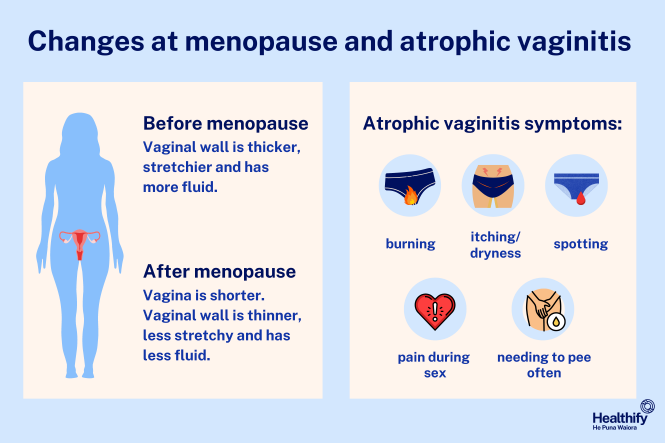If you're a frequent visitor to Healthify, why not share our site with a friend? Don't forget you can also browse Healthify without using your phone data.
Genitourinary syndrome of menopause
Also called atrophic vaginitis, vaginal atrophy and urogenital atrophy
Key points about genitourinary syndrome of menopause
- Menopause can cause changes to your vagina, bladder and sexual feelings.
- When the lining of your vagina gets drier, thinner and inflamed because of a lack of oestrogen it's called atrophic vaginitis.
- Symptoms include burning, itching, spotting, pain during sex, and needing to pee often.
- These symptoms are very common.
- You don’t have to live with it – there are simple and effective treatments available.

Genitourinary syndrome of menopause is the changes to the lining of your vulva and vagina (atrophic vaginitis) and the resulting changes to your urinary and sexual function (peeing and sex) which can happen at menopause.
Atrophic vaginitis is a condition where the lining of your vagina gets drier, thinner and less stretchy because of a lack of oestrogen.
It’s most common in women going through menopause because oestrogen levels drop a lot at this time. However, it can also occur in younger women and people assigned female at birth, due to breastfeeding, cancer treatment or having your ovaries removed, which reduces oestrogen levels. Some birth control pills or medicines that counteract oestrogen, (eg, tamoxifen) can cause these symptoms too.
Symptoms include burning, itching, spotting, pain during sex, and needing to urinate (pee) often.
When your body has less oestrogen, you also produce less vaginal fluid and the acid balance in your vagina changes which can irritate your vaginal tissue.

Image credit: Healthify He Puna Waiora
Note: The lack of oestrogen that happens at the time of menopause is different from low levels of oestrogen in children due to differences in sex development.
Vaginal/genital symptoms include:
- vaginal dryness and loss of elasticity – this is usually the first symptom and you may notice pain during sex because of this
- burning and/or itching in your vagina
- vaginal discharge which may be a yellow colour
- spotting or bleeding, eg, during or after sex
- itching around your vulva (your external genitals)
- shortening and tightening of your vaginal canal which can also be noticed during sex.
You may also have urinary symptoms including:
- frequent urinary tract infections (UTIs)
- urinary incontinence (being unable to hold in your pee)
- urinary frequency (peeing more often than usual)
- pain when you pee
- blood in your pee
- a burning feeling when you pee.
See your healthcare provider if you have any of these symptoms. This is especially important if you have any type of bleeding that's unexpected such as after sex, or after your periods seemed to have stopped because you've been through the menopause. Read more about bleeding after sex.
These symptoms can affect your quality of life and your relationship with your partner, but there are things that can be done to help.
Your healthcare provider will diagnose genitourinary syndrome of menopause based on your symptoms and a pelvic exam, which includes looking at your vulva (the outside part of the vagina), vagina and cervix. Atrophic vaginitis can be diagnosed from the changes to the appearance of your vulva and vagina without needing further tests.
Tests may also be done to rule out other conditions. These may include:
- a cervical screening test
- urine testing
- an ultrasound
- vaginal infection testing (done by sending a swab from your vagina to the lab for analysis).
If you are menopausal and have bleeding after sex, or after your periods seemed to have stopped, your healthcare provider may do an endometrial biopsy (take a small piece of tissue) to check the lining of your womb (uterus) for any changes – including pre-cancerous changes. This can be done during a pelvic exam and is usually straightforward, but may cause some cramping pains.
Hormone treatments are generally the most effective treatments for genitourinary syndrome of menopause.
Topical oestrogen
Topical oestrogen, applied directly to your vagina, is preferable for treating atrophic vaginitis. It can be given in different forms including:
- a cream that you put into your vagina using an applicator
- a tablet that you place into your vagina using an applicator.
You usually use the cream or tablet daily for a few weeks and then 2 to 3 times a week. Your healthcare provider will give you more instructions about this.
Systemic oestrogen (hormone replacement therapy or menopausal hormone therapy)
If you have other symptoms of menopause, eg, hot flushes, your doctor may prescribe oral oestrogen tablets or an oestrogen patch or gel. If you have any of these treatments and you have a uterus (womb), you’ll also need to take another hormone (progesterone) to reduce your risk of endometrial cancer (cancer of the lining of your uterus). This type of hormone therapy isn’t generally recommended if you’ve had breast cancer. Talk to your healthcare provider about whether systemic oestrogen therapy is suitable for you.
Non-hormone treatments
These are also used in the treatment of atrophic vaginitis. They include:
- vaginal lubricants – you can use a water-based lubricant, eg, KY Jelly, during sex
- vaginal moisturisers – water-based moisturisers, eg, Replens, are good if vaginal dryness is a problem most of the time not just during sex
- vaginal dilators – these are devices that can gently stretch your vagina and make sex more comfortable if your vagina has narrowed because of atrophic vaginitis. Your healthcare provider or a specialist pelvic floor physio can show you how to use a dilator.
You may need a combination of hormone and non-hormone treatments to successfully treat your symptoms.
There are things you can do help manage your symptoms if you have genitourinary syndrome of menopause.
- Use non-soap cleansers or warm water to clean your external genital area (vulva). Ordinary soaps can make dry skin problems worse.
- Don’t use vaginal douches. You don’t need to clean inside your vagina as it’s self-cleaning.
- Use emollient cream or petroleum jelly if your vulva is dry or itchy.
- Try a vaginal moisturiser.
- Use a water-based vaginal lubricant when you have sex.
- Some medicines may cause vaginal dryness, eg, anticholinergics, antihistamines, decongestants, antidepressants. If you take medicines, talk to your healthcare provider about whether vaginal dryness could be a side effect. If so there may be an alternative you could take instead.
- Avoid perfumed soaps, shampoos, antiseptics, bubble baths or other products that could irritate your skin.
- Wear cotton underwear and change your underwear each day. Natural fibres such as cotton are more breathable which allows airflow around the skin and keeps it healthy.
- Prioritise your sexual health. Discuss the impacts of your symptoms with your partner. Enjoy more sexual foreplay to increase vaginal lubrication during sex.
Lower oestrogen levels are a natural part of going through the menopause, but there are things you can do to stop atrophic vaginitis from getting worse.
- Don’t use products that irritate your vagina, such as perfumes, dyes, shampoo, detergents or douches to clean the inside of your vagina.
- Regular sexual activity, with or without a partner, is good for atrophic vaginitis as it increases blood flow to your vaginal tissue and helps keep it healthy.
- Avoid smoking – smoking can lessen blood flow to your vagina and also reduces the effects of oestrogen in your body. It can also worsen dry skin problems.
Genitourinary syndrome of menopause can’t be cured, but you don’t have to live with the discomfort of vaginal dryness and urinary symptoms such as incontinence and needing to pee often.
There are hormonal and non-hormonal treatments that can successfully manage your symptoms, but it’s important to treat atrophic vaginitis as soon as possible to stop it getting worse. It’s a good idea to discuss this with a healthcare provider and be examined by them to check there are no other issues that need to be addressed.
Brochures
Vulvovaginal symptoms after menopause – information sheet(external link) Australian Menopause Society, Australia
Atrophic vaginitis(external link) NHS, UK
References
- Vaginal atrophy(external link) Cleveland Clinic, US, 2023
- Vaginal atrophy(external link) Mayo Clinic, US, 2021
- Atrophic vulvovaginitis(external link) Dermnet, NZ, 2014
- Vaginal atrophy (atrophic vaginitis(external link)) Harvard Health Publishing, US, 2024
Credits: Healthify editorial team. Healthify is brought to you by Health Navigator Charitable Trust.
Reviewed by: Dr Angharad Dunn, GP, Wellington
Last reviewed:
Page last updated:





